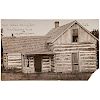Carrie Nation ANS, Plus Group of Photographs
About Seller
6270 Este Ave.
Cincinnati , OH 45232
United States
With offices in Cincinnati, Cleveland and Denver, Cowan’s holds over 40 auctions each year, with annual sales exceeding $16M. We reach buyers around the globe, and take pride in our reputation for integrity, customer service and great results. A full-service house, Cowan’s Auctions specializes in Am...Read more
Two ways to bid:
- Leave a max absentee bid and the platform will bid on your behalf up to your maximum bid during the live auction.
- Bid live during the auction and your bids will be submitted real-time to the auctioneer.
Bid Increments
| Price | Bid Increment |
|---|---|
| $0 | $25 |
| $500 | $50 |
| $1,000 | $100 |
| $2,000 | $250 |
| $5,000 | $500 |
| $10,000 | $1,000 |
| $20,000 | $2,500 |
| $50,000 | $5,000 |
| $100,000 | $10,000 |
About Auction
Nov 21, 2014 - Nov 22, 2014
Cowan's Auctions dawnie@cowans.com
- Lot Description
Carrie Nation ANS, Plus Group of Photographs
Lot of 7, including postcard of log cabin, captioned in negative Carrie Nation"s Old log Cabin / Her Oklahoma Home. / Copyrighted 1908 by Dedrick. Reverse addressed to Kate Doneghy, Macon, MO. with pencil note signed Your Devoted Niece Carry. Entire note: My Dear Aunt Your letter to hand while my health is good my arms are too lame to while it is a struggle Dear Aunt to [about 1 1/2 lines partially erased] I live from day to day only He has Said I will never leave thee you forsake Thee but I cannot write often or much Annie & girls are better.
The lot also includes the following photos: CDV of Nation's father, George Moore; cabinet photograph of Nation with a hatchet in hand, copyrighted 1901; cabinet photograph of Nation and her (second) husband and four children; 2 cabinet card-sized photos on 6 x 8 in. mounts showing Nation in jail praying, each captioned on verso, Carry nation in jail. Taken while in prayer.
Accompanied by the autobiography: The Use and Need of the Life of Carry A. Nation. Written by Herself. Topeka: F.M. Steves & Sons, 1905. 8vo, printed paper wraps, 201pp plus 1p ad.
Carrie (also spelled Carry) Amelia Moore Nation was born in Gerrard County, KY, in 1846. Because of financial difficulties, the family moved a number of times during her childhood, finally settling in Belton, MO, moving to Kansas City when threatened by Confederate soldiers. While nursing Union soldiers, she met a young physician, Dr. Charles Gloyd. They were married in 1867. The doctor was by all accounts an alcoholic, and one of the reasons Nation became so radical a prohibitionist. They separated about a year after the marriage, and he died in 1869 of alcohol-related issues. She married David Nation in 1874, a minister, journalist, attorney, and nearly two decades her senior. He also had children by an earlier marriage.
David, also, seems to have been something of an "activist," or troublemaker, depending on one's point of view. They purchased a farm in Texas, but it failed since neither knew much about farming. After some political problems, they moved to Medicine Lodge, KS, where Nation ultimately began her temperance campaign.
When her protests and hymns had little effect, she decided to pray for direction. She swore she heard God tell her to "go to Kiowa" and reassured her that he would stand by her. She interpreted this as telling her to take something to smash the bars. She began with rocks, then moved up to her signature hatchet, and expanded her range of towns. Her mother was known to have mental problems; her daughter had mental problems. By the end of her life, Nation, also, was institutionalized. She died in the Evergreen Place Hospital in 1911.Cdv of George Moore missing upper right corner. 1901 photo dark (can barely see hatchet). Photo of family with wrinkle in center (as mounted by photographer). Postcard missing lower corner and some text erased as above. Minor scuffing of two jail photos. Book is worn; cover off and torn; page edges scuffed.Condition
- Shipping Info
-
SHIPPING. At the request of the buyer, Cowan's will authorize the shipment of purchased items. Shipments usually occur within two weeks after payment has been received. Shipment is generally made via UPS Ground service. Unless buyer gives special instructions, the shipping method shall be at the sole discretion of Cowan's Auctions, Inc.. Cowan's is in no way responsible for the acts or omissions of independent handlers, packers or shippers of purchased items or for any loss, damage or delay from the packing or shipping of any property.
-
- Buyer's Premium



 EUR
EUR CAD
CAD AUD
AUD GBP
GBP MXN
MXN HKD
HKD CNY
CNY MYR
MYR SEK
SEK SGD
SGD CHF
CHF THB
THB





